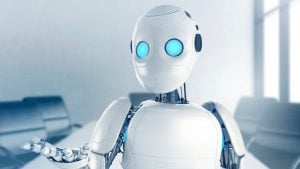2012: Professor Philip Parker at the Insead Business School created software capable of generating more than 200,000 books.
2014: The Nikkei Hoshi Shinichi Literary Award panel decided to consider the books authored by artificial intelligence software apart from human authors. And the results of the latter are–surprisingly and scarily–not that bad.
Apple’s Siri in 2011 , Amazon’s Alexa in 2014 and Google Assistant in 2016 – the trio personal or digital assistants – help keep you connected, informed, in the right place, and on time by simply using your voice.
HDFC Bank’s Web – Bot –‘Eva’ (Electronic Virtual Assistant) – which has successfully addressed over 2.7 million customer queries in six months to become India’s largest banking chatbot.
The BOT revolution is all set to become the biggest transformation in the world’s workforce since the industrial revolution. Robotic process automation (RPA) has already started reshaping the workplace dynamics. Chatbots, robots, and virtual assistants powered by advanced algorithms have already secured a place in the workforce. As organizations become more attuned with automation, RPA will take over low value – repetitive and mechanical jobs Oxford University researchers believe that about 47% of all jobs will be completely taken over by robots within the next 17 years. Gartner Group has also published findings stating that on a global scale, a third of the jobs will be lost to robots by 2025. The spending on Digital transformation are predicted to increasingly emphasize automation. This year, AI is all set to becoming a reality at the workplace.
“The silver lining however is that automation will also create jobs despite an overall belief and fear of job losses. The relationship between man and machine has always been viewed with skepticism and initially always met with huge political uproar and resentment. However, this resolution is unstoppable and will eventually set a place for itself.”
The silver lining however is that automation will also create jobs despite an overall belief and fear of job losses. The relationship between man and machine has always been viewed with skepticism and initially always met with huge political uproar and resentment. However, this resolution is unstoppable and will eventually set a place for itself. The technological advancement whenever came in conflict with human skills has always created an upheaval. HR and businesses will need to work together and plan now for collectively and individually adapting to the new era of bots.
Paul Donaldson, UK practice lead for automation at sourcing consultancy Alsbridge states “Virtual workers should be included as part of an overall resourcing strategy. Robots will operate 24/7 and won’t take breaks but they still need to be managed to make sure they are working at an optimum level… Understanding the capabilities of this new workforce and ensuring they work in conjunction with your existing teams is a key activity for HR.”
With robots and artificial intelligence now being able to replicate processes once considered as doable only by humans, the challenge and opportunity for businesses is clear. But is HR fraternity and the organizations waking up with expected speed to address the situation?
Danielle Harmer – the chief people officer at Metro Bank, fears that if HR is not actively involved in organizational design and automation conversations, then automation could happen for the wrong reasons – namely cost-cutting instead of enhancing what the business does. The challenge principally stops being one of working out which jobs should be replaced and how to manage job losses. Instead it becomes more of an opportunity – a chance to work out how technology might augment employees’ day-to-day activities and what kinds of new job descriptions might be created.
HR would need to be deeply involved in decisions regarding implementation of automation. HR will have to be a part of it, be open to yet another learning phase – study researches, reports and studies, and attend conferences. Be proactive and apply strategic thinking on how this resolution will influence and will impact the organization.
Impact on HR Function
The HR function itself will be hugely impacted by this revolution. Robotic Process Automation (RPA) will automate rule-based, repetitive and standardized tasks. HR will have more time to focus on more complex tasks, including making strategic decisions and forming hypotheses as well as decisions based on the data. Interpersonal skills, emotional intelligence, entrepreneurial spirit, and leadership are some skills which involve emotions and feelings in which the AI cannot replace humans. To drive this point further, a FuturaCorp study posits that although four out of every five deterministic jobs are bound to be replaced by robots, four out of every five complex problem solving jobs will still be retained by human beings.
The HR function will able to focus on more strategic issues, including employee experience programs and training. This training would need to focus on reskilling not only themselves but their current employees as well as preparing them for this BOT revolution. When AI becomes a fact of workplace life, HR should be able to help people gain a more optimistic view – which is that the rise of bots will bring economic prosperity and a major increase in job satisfaction. BOTs entering the workplace will bring with along new set of jobs where humans will always be the master.
#Editorial by: Kashesh Verma and Romesh Srivastava



